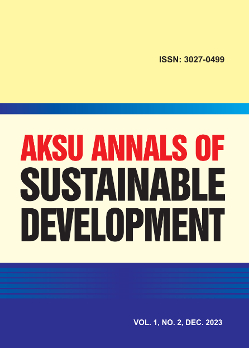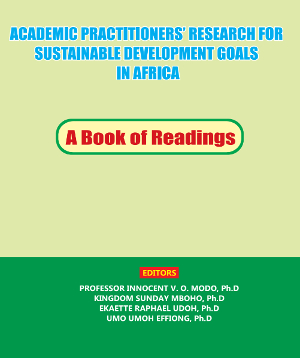MASS MEDIA AND CULTURAL RE-ORIENTATION IN NIGERIA: PROSPECTS AND CHALLENGES
DOI:
https://doi.org/10.60787/AASD-v2i1-37Keywords:
Mass Media, Culture and Cultural-OrientationAbstract
This study examined the positive correlation between the mass media and cultural preservation and re-orientation in Nigeria. The study maintained that the mass media are parts and parcels of the people’s culture and that culture is learned and transmitted through the mass media. This paper adopted the qualitative research method and reviewed the available literature in the field of media and cultural studies. The mass media are reputed to play a crucial role in cultural mediation and the culture industry is made up of the mass media industry. This work posits that culture constitutes the whole life of a people which includes their customs, habits, beliefs, religions and crafts, language, technology and dance among others. The mass media are the custodians of culture and they also enhance the transmission of cultural and social heritage from one generation to the other. The prospect of the mass media in facilitating cultural re-orientation lies in their power to frame and set agenda for the people based on their programmes and programming geared towards mental re-adjustment and positive thinking towards growth and betterment of the country. This paper noted that the major challenge facing the mass media in attempting cultural re-orientation is the diverse ethnic and multi-cultural nature of Nigeria. The study recommended that the mass media should hype the truth, transparency, patriotism and altruistic leadership as a panacea to any impediment against the entrenchment of acceptable cultural values in Nigeria.
Downloads
References
Akarika, D. C. (2018). A critique of cultural
imperialism theory. AKSU Journal of
Communication Research. 3, 111-125.
Akpan, U. U. and Bassey, B. E. (2018). Media
sensitization on financial literacy among
residents of Akwa Ibom State, Nigeria.
Media & Communication Currents. 2(1), 37-
Akpan, C., and Effiong, U., (2021).
Communication and Social Inclusion
Advocacy for Persons with Disabilities in
Akwa Ibom State, Nigeria. International
Journal of African Language
and Media Studies, 1(1), 60-75.
Allimi, T. (2005). Cultural journalism in Nigeria. In J.
B. Yusuff (Ed.).Culture and the media in
Nigeria (pp. 50 -62). National Institute for
Cultural Orientation, Abuja.
Anyaebunam, N. (2005). Cultural journalism in
Nigeria. In J. B. Yusuff (Ed.). Culture and the
media in Nigeria (pp. 28 -49). National
Institute for Cultural Orientation, Abuja.
Anaeto, S. G., Onabajo, O. S., and Osifeso, J. B.
(2008). Models and theories of
Communication. African Renaissance Books
Incorporated, Bowie, USA.
Asemah, E. S. (2011). Selected mass media themes.
University of Jos Press. Jos, Nigeria.
Baran, S. (2013). Introduction to mass
communication: Media literacy and culture.
The McGraw-Hill
Companies, USA.
Baran, S. J. and Davis, D. K. (2012). Mass
communication theory: Foundations, ferment and future (6th ed.). Wadsworth Cengage
Learning, Canada.
Bassey, B.E. (2016). Coverage of citizens’socioeconomic rights and political issues in a
State Newspaper in Nigeria. In E. Mojaye &
G. Oboh (Eds.). Journal of Communication
and Media Research, 8(2), 219-229.
Bassey, B. E. (2021). Mediatisation of development:
An empirical review of the strengths and
weaknesses of the mass media in the
reportage of development in Nigeria. AKSU
Journal of Social Sciences, 1(2), 53- 65.
Ekeanyanwu, N.& Edewor, P. (2009). Cultural
implication of ICTs and globalisation in
Nigerian society. In E. Mojaye& G. Imoh
(Eds.). Journal of Communication and Media
Research. 1(2). 13- 29.
Folarin, B. (2000). Theories of mass communication:
An introductory text. Sterling-Horden
Publishers Nig. Ltd, Ibadan.
Griffin, E. (2000). A first look at communication
theory. (4th ed.). McGraw-Hill, New York.
Hasan, S. (2013). Mass communication: Principles
and concepts. (2nd ed.). CBS Publishers &
Distributors, New Delhi.
Isa, M. M. (2005). Culture and the media. In J. B.
Yusuff (Ed.). Culture and the media in
Nigeria (pp. 7 -27). National Institute for
Cultural Orientation, Abuja.
James, C., Okon, G. B. and Ohiagu, O. (2019).
Indigenous television programme and the
aesthetics: Analysis of AkpasaMmi on NTA
Uyo. AKSU Journal of Communication
Research. 4, 110-125.
Joe, E. D. and Udoudo, A. (2018). Developing Nigeria
n cultures for global relevance an d poverty
reduction through N TA international’s
projection of Calabar carnival. In A. Udoudo
& C. Ochonogor (Eds.). Integrity in news
reporting: A reader(pp. 300-320).
Journalism Educator Foundation, Port
Harcourt.
Julius, A and Okorie, NU. (2016). The Impact of
Education on Small-scale Farmers; Use of
ICT in Abuja, Nigeria. Journal of Agricultural
Economics, Extension and Rural
Development, 4 (7), 476-487
McQuail, D. (2010). McQuail’s mass communication
theory (6th ed.). SAGE Publications, London.
Ngonso, B. F., Atairet, A. C., Bassey, B. E., Williams,
A. M. and Egielewa, P.E. (2023a). Media
complexity in the mirroring of Nigeria
political system: A historical appraisal.
International Journal of African Languages
and Media Studies. 3(1), 175- 189.
Ngonso, B. F., Atairet, A. C., Bassey, B. E., and
Egielewa, P. E. (2023b). Media and society:
The controversy in a political system.
Journal of New Media and Mass
Communication, 104, 99- 106.
Ogbuoshi, C. L. (2020). Understanding the dynamics
of communication theories and models.
Linco Enterprises, Enugu.
Nkeme, KK., Okorie, NU and Ekanem, JT., (2021).
Assessment of Ownership and Utilization of
Information Communication Technologies
(ICTs) by Agricultural Extension Agents in
North Central Nigeria. AKSU Journal of
Agriculture and Food Sciences, 5(1), pp. 1-
Sambe, S. (2008). Introduction to mass
communication practice in Nigeria.
Spectrum Books Limited, Ibadan.
Udoudo, A. J. (2012). Ethnic diversity, ethical issues
and cultural revival among African peoples:
The place of communication. In M. Mboho
& H. Batta. (Eds.). The companion to
communication and development issues
(pp. 85-96). BSM Resources, Uyo.
Udoudo, A. and Bassey, B. E.(2011). Reporting
political campaigns in Nigeria: A study of
news coverage of ACN rally in Uyo by The
Pioneer and The Sensor newspapers. In E.
Mojaye & G. Imoh (Eds.).Journal of
Communication and Media Research,3(1),
- 53.
Ukpe, A. P. and Akarika, D. C. (2019). The broadcast
media as agents of moral orientation for
youths in Akwa Ibom State. AKSU Journal of
Communication Research. 4, 1-14.
Wilson, D. (1997). Communication and Social Action.
Footstep publications, Port Harcourt..
Downloads
Published
Issue
Section
License
Copyright (c) 2024 AKSU Annals of Sustainable Development

This work is licensed under a Creative Commons Attribution-NonCommercial-NoDerivatives 4.0 International License.
Manuscript content on this site is licensed under Creative Commons Licenses. Authors wishing to include figures, tables, or text passages that have already been published elsewhere are required to obtain permission from the copyright owner(s) for both the print and online format and to include evidence that such permission has been granted when submitting their papers. Any material received without such evidence will be assumed to originate from the authors.





 ICIDR Publishing House
ICIDR Publishing House